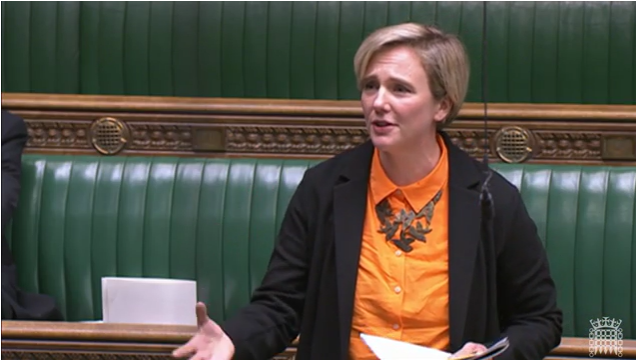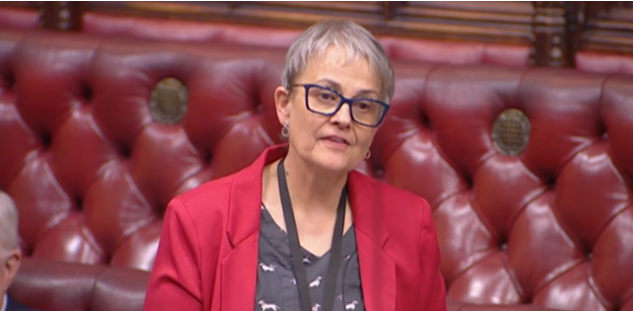Brexit & Beyond newsletter
30 May 2023
 Welcome to the 30 May 2023 Brexit & Beyond newsletter
Welcome to the 30 May 2023 Brexit & Beyond newsletter
Last week, the House of Commons considered the Lords amendments to the Retained EU Law Bill. The UK Government’s legislation to implement the Electronic Travel Authorisation scheme was discussed in the House of Lords. A Westminster Hall debate was held on visa arrangements for inshore industry fishing crew.
Retained EU Law Bill
The House of Commons considered the Lords amendments to the Retained EU Law (Revocation and Reform) Bill on Wednesday 24 May. (Official Report part 1, Official Report part 2) The Solicitor General Michael Tomlinson outlined the Government’s reasons for disagreeing with the Lords amendment on giving devolved governments, rather than UK Government ministers, the final say on whether EU rights should be retained. Tomlinson said that the amendment “undermines a fundamental plank of the Bill—namely, ending the special status of retained EU law”. He said the vast majority of these retained rights “overlap with rights that we already have…the Lords amendment would create the very legal uncertainty that was previously criticised.”

UK Government’s statistics on Retained EU Law | Source: Retained EU Law dashboard
Parliamentary scrutiny
One of the Lords amendments would require significant changes to Retained EU Law (REUL) to be subject to greater parliamentary scrutiny. Tomlinson said the procedures proposed are “novel and untested. This Government do not accept the principle that Parliament should be able to amend statutory instruments.” He added that it would bring “significant delay” to the processes and said the scrutiny measures in the Bill are “a sufficient safeguard”. Stella Creasy (Labour) noted arguments in the Commons about the lack of scrutiny of these laws while the UK was a member of the EU, but said, “two wrongs do not make a right”. She stated, “Anybody who has sat on a statutory instrument Committee knows full well that they are the Henry Ford of democracy…. taking back control ought to be about us doing our job. If Ministers and MPs vote down the amendments tonight, we will be voting ourselves out of a role.” Creasy and Conservative Brexiteer peer Archie Hamilton have penned an article together “united by [their] mutual worry parliament is sleep-walking into voting away its own sovereignty through the Retained EU Law Bill.” It outlines the proposals in the amendment which would ensure Statutory Instruments (SIs) made by the Bill are referred to a joint committee of both Houses: if an SI contains significant changes, members would have the ability to propose changes to it.

Labour MP Stella Creasy speaking in the House of Commons | Source: UK Parliament
Environmental protection
Lords amendment 15 sets out a number of conditions relating to environmental protections and food standards. Tomlinson said this is “unnecessary. Ministers have made it clear repeatedly at every stage of this Bill’s passage in both Houses that we will not lower environmental protections or standards.” Alyn Smith (SNP) challenged the Government, saying, “If we are not going to dilute the [very high environmental standards] and there is no intention from those on the Treasury Bench to do so, let us bang that into the Bill and make it explicit.”
Jacob Rees-Mogg, who introduced the Bill to Parliament when he was Business Minister, criticised the amendments, saying, “This Bill was the opportunity to get growth, but instead we are changing laws on anchovies. That seems to me to be pretty fishy.” The Government’s amendment replaces the sunset clause (at the end of the year most REUL would have fallen off the statute books unless preserved) with a list of laws which will be repealed at the end of the year. He said of these 587 rules, “hardly a single one changes alignment with the European Union”. He questioned whether there is “some decision that we will in fact remain aligned with the European Union, possibly because of the Windsor protocol? Otherwise, why are we not repealing all those strange and unimportant things?”
Sammy Wilson (DUP) questioned the Bill’s (lack of) impact for NI. He stated, “Given that we have been left in the position of being an annex to the EU, many of these changes do not apply”. The Solicitor General reassured him, “the Bill’s provisions apply equally to all parts of the United Kingdom…Northern Ireland Ministers will benefit from the same powers as Ministers of the Crown, not least thanks to amendments tabled in the other place.”
The House of Lords will consider the Commons amendments on 6 June.
Electronic Travel Authorisation scheme
Baroness Ritchie brought forward a motion to regret the Immigration (Electronic Travel Authorisations) (Consequential Amendment) Regulations 2023 which require international visitors to obtain an Electronic Travel Authorisation (ETA) when visiting the UK. This does not apply to UK or Irish citizens. However, international visitors arriving in the Republic of Ireland and travelling on to Northern Ireland would be required to have an ETA. Ritchie stated that the regulations will impose “additional bureaucracy…creating barriers that will potentially cause significant damage to the tourism industry”. She called for an exemption for the tourism industry, noting there is already a precedent - legal residents in Ireland do not require an ETA.

Baroness Ritchie speaking in the House of Lords | Source: UK Parliament
Minister for Migration and Borders Lord Murray told peers that the ETA scheme will “enhance the Government’s ability to prevent the travel of those who pose a risk to the UK.” He said the Government has “carefully considered the concerns about the application of the ETA scheme within the common travel area” and that an exemption for tourists “would result in an unacceptable gap in UK border security that would potentially allow persons of interest or risk, who would otherwise be refused an ETA, to enter the UK legally, undermining the very purpose of the ETA scheme, which is to prevent the travel of those who pose a threat to the UK”. He said officials would meet with the Northern Ireland Tourism Alliance, Tourism Ireland and Tourism Northern Ireland in early June “to explore how we can best work together to communicate the ETA requirement.” The Northern Ireland Tourism Alliance (NITA) has previously said it is “disappointed” that the Government “has shown no flexibility to protect seamless travel across the island for most visitors.” NITA said over 70% of visits to NI arrive via Dublin and that the ETA scheme risks 25% of all tourism spend in NI.
The scheme will launch in October 2023 and will be phased in by the end of 2024. An ETA is expected to cost less than £20.
Visas for the fishing industry
Jim Shannon (DUP) secured a Westminster Hall debate on visa arrangements for inshore industry fishing crew. He said Northern Ireland’s fishing fleet is penalised “simply because of geography”. The Nationality and Borders Act clarifies the position that migrant workers within 12 nautical miles of the UK require a work visa. Shannon explained, “Our reliance on access to inshore waters means that employing crew on transit visas is no longer an option for fishing vessels in Northern Ireland…Northern Ireland’s fishermen have had to watch EU vessels employ foreign workers in UK territorial waters. They are there without any visa scrutiny whatever, while Northern Ireland fishermen are forced to remain outside those waters.” He suggested, “Instead of trying to force square pegs into round holes, perhaps it would be better to begin a dialogue between the fishing industry and the Home Office as to how provision can be made within the framework of the skilled visa system to recognise those irregularities and help to make a better fit.”
Minister for Immigration Robert Jenrick stated that the Home Office stands ready to deliver “a comprehensive package of support to the sector”. He said, “We believe that with the right level of support, the sector should be able to further navigate the existing immigration system [and] we have decided to add further fishing occupations—share fishermen, trawler skippers and deckhands on large fishing vessels—to the shortage occupation list.”
Other news
- EU legislation to implement the Windsor Framework was considered by the 27 EU ambassadors on 24 May and today is set to be adopted by ministers at the EU General Affairs Council.
- Invest NI has opened a new office in Milan. Steve Harper, Invest NI’s Executive Director of International Business said, “The Windsor Framework gives Northern Ireland a unique position as the only region with access to both the UK home market and the EU single market. This market access for goods to the EU single market makes it easier for Italian companies to buy goods from Northern Ireland, therefore providing us with significant opportunities to develop and increase our exports to the EU.”
- The UK has made some changes to its membership of the EU-UK Parliamentary Partnership Assembly.
- Trade NI, an alliance of three of Northern Ireland’s largest trade bodies (Hospitality Ulster, Manufacturing Northern Ireland, and Retail Northern Ireland) has published a report on economic growth for Northern Ireland, ‘A Region Transformed and Creating Prosperity For All: The Prosperity Dividend’. One of the recommendations in the paper is to capitalise on NI’s “unique dual-market access trading position.”
- New data on National Insurance Number registrations in Northern Ireland has been published. Mark Magill, Economist at Ulster University, has a Twitter thread on his findings: fewer people are migrating to NI from the EU, while there is an increase in registrations from non-EU countries, particularly India, Ukraine, and Nigeria. The BBC also reports on the statistics.
- The EU-UK Specialised Committee on Citizens’ Rights met on 25 May. The terms of the Withdrawal Agreement allow EU citizens living in the UK, and UK citizens living in the EU pre-Brexit, to continue living, working, and studying in their host country. The EU-UK joint statement outlines concerns about the protection of the rights of their respective citizens. The Lords European Affairs Committee has written to the Home Secretary, urging her to address problems relating to post-Brexit citizens’ rights. The Committee states that it is “imperative that matters relating to citizens’ rights continue to receive the highest political attention, even as the passage of time since the UK’s exit from the EU grows longer.”
- Following on from the European Commission’s adoption of a draft Memorandum of Understanding (MoU) to establish a framework for structured regulatory cooperation on financial services with the UK, the European Commissioner for Financial Services Mairead McGuinness was in London to meet financial services representatives, the Chancellor, and the Governor of the Bank of England. McGuinness told LBC that the Windsor Framework has “resolved the last difficulties in the [EU-UK] relationship and allows us to move forward.”
- The NI Equality Commission is holding an event on the impact of Brexit on minority ethnic and migrant people in Northern Ireland on 8 June. The Equality Commission has also published videos as part of its campaign ‘Protecting Your Rights After Brexit - No Matter What'.
- On 25 May the European Parliament Committee on Foreign Affairs and the Committee on International Trade held a hearing on the implementation of the EU-UK Trade and Cooperation Agreement. The Committees heard from Tanja Buzek, Chair of the EU-UK Domestic Advisory Group of the European Economic and Social Committee, Elena Crasta of the European Trades Union Congress, Anton Spisak, Senior Fellow at the Tony Blair Institute, and Fergus McReynolds, Director of EU and International Affairs at Make UK.
Sign up to Brexit and Beyond
Sign up for our regular Brexit and Beyond newsletter and get all the latest developments and news delivered straight to your inbox.



